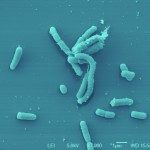Link to Pubmed [PMID] – 25355759
J. Clin. Microbiol. 2015 Jan;53(1):146-59
Yersinia enterocolitica and Yersinia pseudotuberculosis, the two Yersinia species that are enteropathogenic for humans, are distributed worldwide and frequently cause diarrhea in inhabitants of temperate and cold countries. Y. enterocolitica is a major cause of foodborne disease resulting from consumption of contaminated pork meat and is further associated with substantial economic cost. However, investigation of enteropathogenic Yersinia species is infrequently performed routinely in clinical laboratories because of their specific growth characteristics, which make difficult their isolation from stool samples. Moreover, current isolation procedures are time-consuming and expensive, thus leading to underestimates of the incidence of enteric yersiniosis, inappropriate prescriptions of antibiotic treatments, and unnecessary appendectomies. The main objective of the study was to develop fast, sensitive, specific, and easy-to-use immunoassays, useful for both human and veterinary diagnosis. Monoclonal antibodies (MAbs) directed against Y. enterocolitica bioserotypes 2/O:9 and 4/O:3 and Y. pseudotuberculosis serotypes I and III were produced. Pairs of MAbs were selected by testing their specificity and affinity for enteropathogenic Yersinia and other commonly found enterobacteria. Pairs of MAbs were selected to develop highly sensitive enzyme immunoassays (EIAs) and lateral flow immunoassays (LFIs or dipsticks) convenient for the purpose of rapid diagnosis. The limit of detection of the EIAs ranged from 3.2 × 10(3) CFU/ml to 8.8 × 10(4) CFU/ml for pathogenic serotypes I and III of Y. pseudotuberculosis and pathogenic bioserotypes 2/O:9 and 4/O:3 of Y. enterocolitica and for the LFIs ranged from 10(5) CFU/ml to 10(6) CFU/ml. A similar limit of detection was observed for artificially contaminated human feces.
